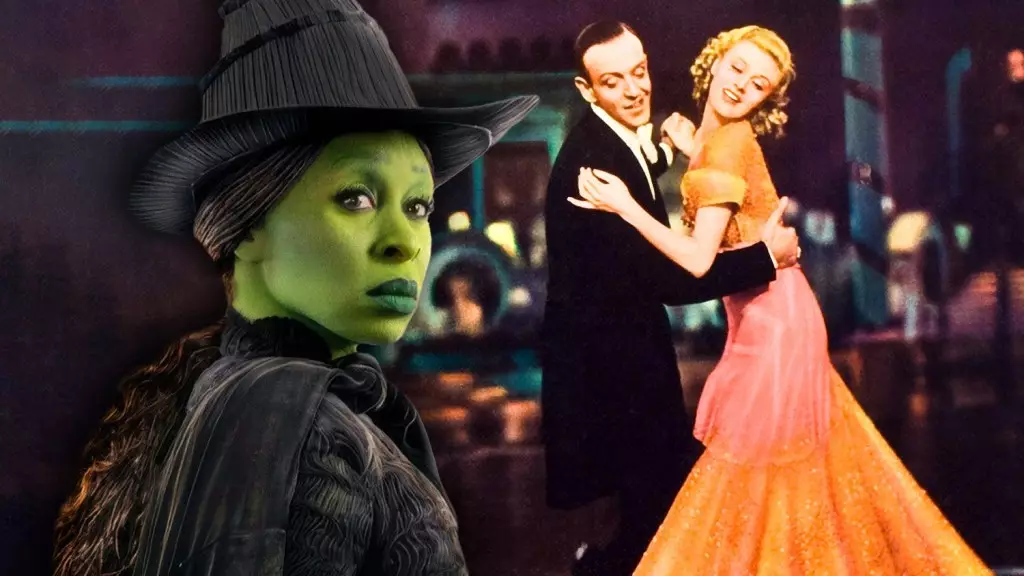The Covid-19 pandemic spurred many individuals to seek comfort in nostalgia, leading to a resurgence in the popularity of classic MGM musicals. Iconic films such as *Singing in the Rain* and *Top Hat* became the soundtrack to countless homes, offering a reprieve from the stress of contemporary life. These musicals were celebrated not only for their catchy tunes but also for their lighthearted stories that brought a sense of joy and optimism in challenging times. However, as we witness the rise of a new generation of musicals, it’s prudent to analyze the tonal shift in these modern renditions, which, while often financially successful and critically acclaimed, tend to diverge from the exuberance of their predecessors.
The Transition in Musical Themes
Unlike the uncomplicated cheerfulness found in the songs and dance numbers of the old musicals, today’s offerings present a more nuanced narrative. The current crop of musicals often indulges in complex themes and characters that grapple with real-life issues and internal conflicts. While the likes of Gene Kelly and Fred Astaire portrayed characters that were charming but ultimately simplistic, modern stars such as Timothée Chalamet and Selena Gomez embody characters with layered emotional landscapes. Their performances invite audiences to connect with relatable struggles, setting a stark contrast to the seemingly effortless escapism of classic musical cinema.
The anticipated release of *Wonka*, featuring Chalamet, extends this trend. Although the musical format remains intact, the characters no longer fit the traditional mold. Instead of a straightforward hero, he presents a multifaceted individual, echoing Bob Dylan’s complexity as an artist—someone who shaped a new cultural lexicon with both melodic innovation and lyrical depth. This shift reflects a broader cultural evolution, as audiences increasingly seek substance and realism in their cinematic experiences.
Musicals are no longer about simplistic love stories or uncomplicated premises; they have become platforms for exploring deep-seated emotions. This change allows for greater character development and deeper narratives, as seen in *Emilia Pérez*, featuring Gascón and Gomez, who navigate a dangerous environment dominated by a cartel boss. Such themes resonate more deeply with contemporary audiences, marking a significant evolution from the lighthearted escapades of characters like Leslie Caron’s Gigi.
Furthermore, Angelina Jolie’s portrayal of Maria Callas in her twilight years encapsulates the internal struggles of a legend grappling with fame’s toll, a narrative far removed from the glamorous escapades of yesteryear’s starlets. The complexity of Callas, who endures personal and professional turmoil, adds emotional gravitas to the musical genre; her challenges speak volumes about ambition, identity, and vulnerability.
From a commercial perspective, musicals like *Wicked* resonate with audiences, generating substantial box office revenue, with Universal celebrating grosses exceeding $500 million. The appeal of such shows lies not only in their established musical scores but also in the star-studded casts that attract viewers. Ariana Grande and Cynthia Erivo, both highly regarded for their vocal prowess, bring contemporary relevance to stories that, while rooted in fantasy, still have emotional depth. Critics are already positioning them as frontrunners for various awards, suggesting a strong future for music-centric storytelling.
In contrast, the reception of Bob Dylan’s work serves as a reminder of the generational and artistic shifts within this genre. While his 1965 Newport Jazz Festival performance signified a pivotal moment in music history, illustrating the tension between tradition and innovation, it serves as an ironic juxtaposition to today’s musicals, which may lack the spontaneity and raw energy that characterized past musical landscapes.
As we navigate this new musical era, it becomes clear that while there is a palpable nostalgia for the uncomplicated joy of classic musicals, the evolution of themes and character complexity in contemporary productions offers a different kind of satisfaction. Today’s musicals aim to provide more than mere entertainment—they endeavor to explore the depths of human experience, marrying lyrical expression with authentic storytelling in a way that resonates with modern sensibilities. As these films continue to grace cinemas, one can only wonder how future audiences will interpret their intricate narratives, potentially redefining what it means to be entertained by a musical.
